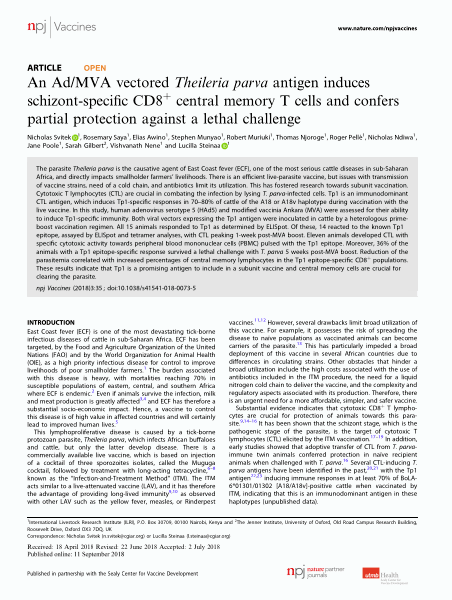An Ad/MVA vectored Theileria parva antigen induces schizont-specific CD8+ central memory T cells and confers partial protection against a lethal challenge
Abstract
The parasiteTheileria parvais the causative agent of East Coast fever (ECF), one of the most serious cattle diseases in sub-Saharan Africa, and directly impacts smallholder farmers’ livelihoods. There is an efficient live-parasite vaccine, but issues with transmission of vaccine strains, need of a cold chain, and antibiotics limit its utilization. This has fostered research towards subunit vaccination. Cytotoxic T lymphocytes (CTL) are crucial in combating the infection by lysingT. parva-infected cells. Tp1 is an immunodominant CTL antigen, which induces Tp1-specific responses in 70–80% of cattle of the A18 or A18v haplotype during vaccination with the live vaccine. In this study, human adenovirus serotype 5 (HAd5) and modified vaccinia Ankara (MVA) were assessed for their ability to induce Tp1-specific immunity. Both viral vectors expressing the Tp1 antigen were inoculated in cattle by a heterologous prime-boost vaccination regimen. All 15 animals responded to Tp1 as determined by ELISpot. Of these, 14 reacted to the known Tp1 epitope, assayed by ELISpot and tetramer analyses, with CTL peaking 1-week post-MVA boost. Eleven animals developed CTL with specific cytotoxic activity towards peripheral blood mononuclear cells (PBMC) pulsed with the Tp1 epitope. Moreover, 36% of the animals with a Tp1 epitope-specific response survived a lethal challenge withT. parva5 weeks post-MVA boost. Reduction of the parasitemia correlated with increased percentages of central memory lymphocytes in the Tp1 epitope-specific CD8+populations. These results indicate that Tp1 is a promising antigen to include in a subunit vaccine and central memory cells are crucial for clearing the parasite.

